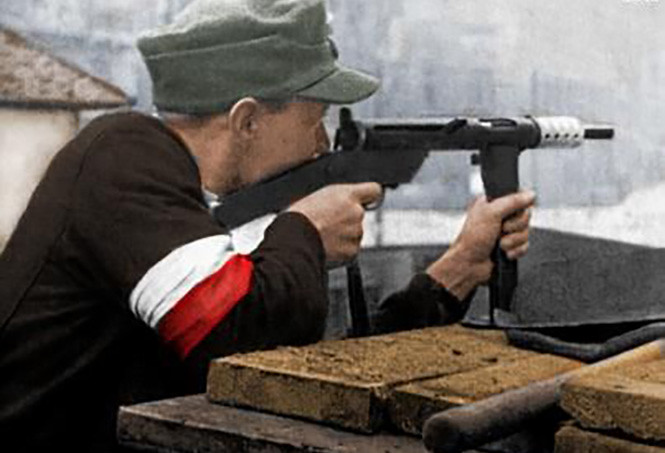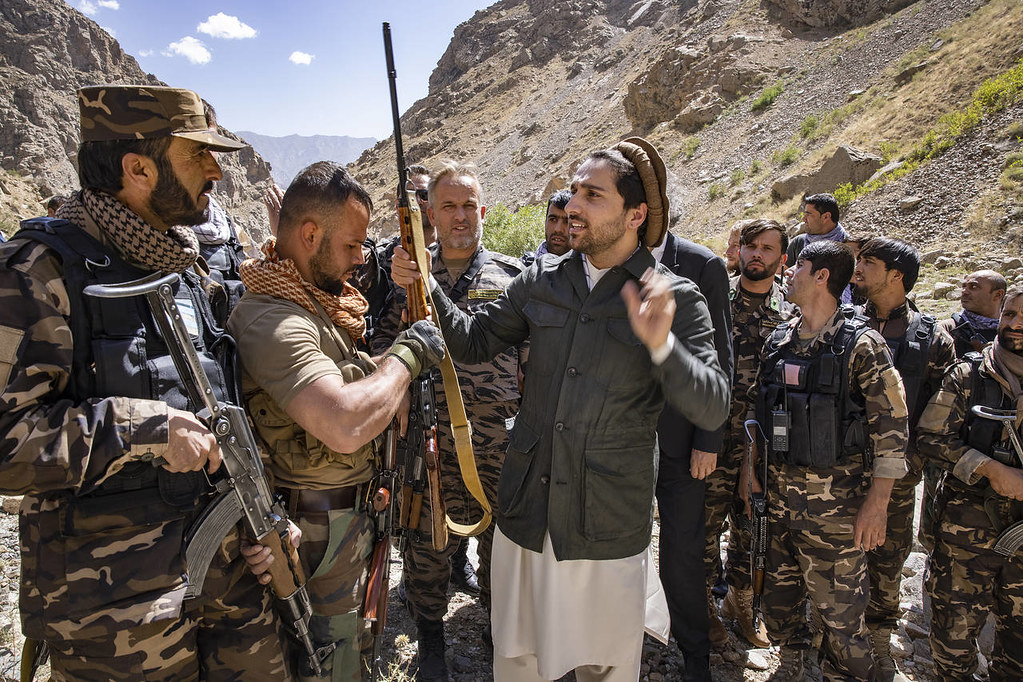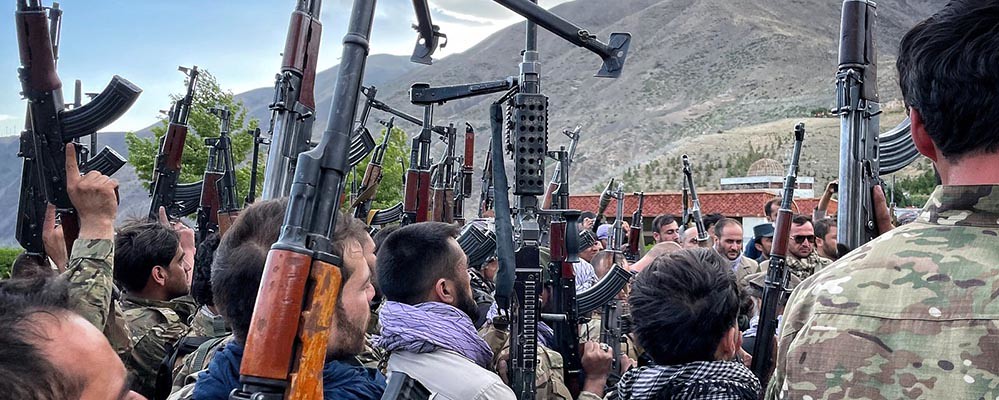The West must listen to this call of the Afghan resistance: let's not repeat 1944
On August 1, 1944, the Polish resistance began in the city of Warsaw the largest armed uprising in Europe occupied by Nazi Germany.
What happened in the Warsaw Uprising of 1944
The Polish resistance was poorly armed but had high fighting morale. Its soldiers defended their Homeland and wanted to regain the Freedom they had lost with the Nazi-Soviet invasion of 1939, in which Poland was defeated but neither their State nor their Army surrendered, continuing the fight on different fronts - the Poles formed one of the largest fighting forces of the Second World War - and starting the resistance in the interior of the country as early as 1939.

With few resources, the Poles were fighting for two months, while the Red Army stopped - by order of Stalin - on the banks of the Vistula River to allow the Germans to liquidate a mainly Catholic Polish resistance that was equally hated by the Nazis and by the Soviets. The western allies limited themselves to sending some logistical aid, which was insufficient for the Uprising to be successful.
On October 2, 1944, exhausted, hungry and out of ammunition, the last Polish fighters in Warsaw surrendered. The Germans, in revenge, literally razed the city of Warsaw. Poland would not regain its Freedom until 45 years later, with the fall of communism, since while the Poles fought in the streets of Warsaw, the leaders of the United States and the United Kingdom had already decided to cede control of Poland to the USSR after the war, condemning the Poles to pass from one totalitarian regime to another.
Panjshir province still resists the Taliban
Right now the West has a great opportunity to learn from history and not repeat the mistake it made with Poland in 1944. Following the rapid collapse of the Afghan democratic state, which has quickly been deprived of its international support, a group of fanatical terrorists have they have taken over almost all of Afghanistan to the indifference of the free world.
I have said "almost all" because the Taliban have failed to take over a small mountainous enclave located just 100 kilometers from Kabul, Panjshir province, which has been resisting first the Soviets and then the Taliban for 40 years. The population of that territory, with an area of 3,610 square kilometers and 172,000 inhabitants, is ready to continue fighting against the Taliban. Afghan military who want to continue fighting have taken refuge there and the current interim president of Afghanistan, Ashraf Ghani, called yesterday for resistance against the Taliban from Panjshir.

Afghan resistance leader launches appeal for help
There, in Panjshir, the Tajik Ahmad Shah Masud, nicknamed the "Lion of Panjshir", fought the Soviets for years and was killed by Al-Qaeda terrorists on September 9, 2001, two days before the attacks by that terrorist group against the United States. It was in Panjshir that the international coalition found its first Afghan allies, the Northern Alliance, when the first foreign military forces began to arrive in the country. Today Ahmad Shah Masud's son, Ahmad Masud, 32, is leading the armed resistance in Panjshir. The day before yesterday he signed an article in The Washington Post asking for help, signing as "leader of the National Resistance Front of Afghanistan." In the article he notes:
"I write from the Panjshir Valley today, ready to follow in my father’s footsteps, with mujahideen fighters who are prepared to once again take on the Taliban. We have stores of ammunition and arms that we have patiently collected since my father’s time, because we knew this day might come.
We also have the weapons carried by the Afghans who, over the past 72 hours, have responded to my appeal to join the resistance in Panjshir. We have soldiers from the Afghan regular army who were disgusted by the surrender of their commanders and are now making their way to the hills of Panjshir with their equipment. Former members of the Afghan Special Forces have also joined our struggle.
But that is not enough. If Taliban warlords launch an assault, they will of course face staunch resistance from us. The flag of the National Resistance Front will fly over every position that they attempt to take, as the National United Front flag flew 20 years ago. Yet we know that our military forces and logistics will not be sufficient. They will be rapidly depleted unless our friends in the West can find a way to supply us without delay".

«The Taliban is not a problem for the Afghan people alone»
Ahmad Masud further states: "The United States and its allies have left the battlefield, but America can still be a “great arsenal of democracy,” as Franklin D. Roosevelt said when coming to the aid of the beleaguered British before the U.S. entry into World War II." Therefore, the Afghan resistance leader adds: "I entreat Afghanistan’s friends in the West to intercede for us in Washington and in New York, with Congress and with the Biden administration. Intercede for us in London, where I completed my studies, and in Paris, where my father’s memory was honored this spring by the naming of a pathway for him in the Champs-Élysées gardens."
Masud addresses the West with these words: "Know that millions of Afghans share your values. We have fought for so long to have an open society, one where girls could become doctors, our press could report freely, our young people could dance and listen to music or attend soccer matches in the stadiums that were once used by the Taliban for public executions — and may soon be again." And he adds: "The Taliban is not a problem for the Afghan people alone. Under Taliban control, Afghanistan will without doubt become ground zero of radical Islamist terrorism; plots against democracies will be hatched here once again.".

«My mujahideen fighters and I will defend Panjshir as the last bastion of Afghan freedom»
His article ends with these words: "No matter what happens, my mujahideen fighters and I will defend Panjshir as the last bastion of Afghan freedom. Our morale is intact. We know from experience what awaits us. But we need more weapons, more ammunition and more supplies. America and its democratic allies do not just have the fight against terrorism in common with Afghans. We now have a long history made up of shared ideals and struggles. There is still much that you can do to aid the cause of freedom. You are our only remaining hope."

Masud quotes the wise words of a Sephardic Jewish philosopher friend of his father
One of the things that most caught my attention in this article by Masud is that he recalls some words by the French philosopher Bernard-Henri Lévy, a Sephardic Jew (that is, of Hispanic origin), something unthinkable in the speeches of Islamist leaders. Masud says that Lévy was a friend of his father, and that in 1998, in a cave in the Panjshir valley, the philosopher told them: "When you fight for your freedom, you fight also for our freedom." Returning to the beginning of this post, it so happens that during World War II, Polish soldiers used a historical motto of their homeland: "Za naszą i waszą Wolność" (For our and your Freedom). Thus they expressed that although they fought far from their Homeland, their cause was common with that of their allies. Sadly, the West made the mistake of turning its back on them. Let's not repeat that mistake.
|
Don't miss the news and content that interest you. Receive the free daily newsletter in your email: Click here to subscribe |
- Most read
- The 'hole' without civil flights around Paris during the opening of the Olympic Games
- Spain vetoes the Russian frigate 'Shtandart', which intended to reach Vigo, in all its ports
- The interior of the Statue of Liberty torch and the sabotage that canceled its visits
- The ten oldest national flags in the world that are still in use today
- The BNG boasts of the support of a terrorist group and a dictatorship at a public event
- The Russian intelligence document that sparked a hoax about French troops
- A virtual tour of ancient Rome in full color, just as it was in its heyday

 ES
ES





Opina sobre esta entrada: